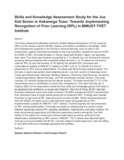Please use this identifier to cite or link to this item:
http://ir-library.mmust.ac.ke:8080/xmlui/handle/123456789/2201Full metadata record
| DC Field | Value | Language |
|---|---|---|
| dc.contributor.author | Waweru, Samuel Gathuka | - |
| dc.contributor.author | Oluoch, Fred Koyaya | - |
| dc.date.accessioned | 2023-05-29T08:01:18Z | - |
| dc.date.available | 2023-05-29T08:01:18Z | - |
| dc.date.issued | 2023-03-03 | - |
| dc.identifier.uri | http://www.afritvetjournal.org/index.php/Afritvet/article/view/155 | - |
| dc.identifier.uri | http://ir-library.mmust.ac.ke:8080/xmlui/handle/123456789/2201 | - |
| dc.description.abstract | The Kenya National Qualification Authority (KNQA) defines Recognition of Prior Learning (RPL) as the process used to identify, assess, and certify a candidate’s knowledge, skills, and competencies acquired in non-formal or informal learning, such as work or life experiences, against prescribed standards or learning outcomes. Despite the launch of RPL by KNQA in 2021, its implementation in Kenya, especially Western region, has generally been slow. This study was therefore conducted to: i) To identify key non-formal and informal economy-driving industries with uncertified skilled workers in, ii) To determine the level of need for RPL by Jua Kali workers; iii) To identify the possible RPL processes and nomenclature suitable to MMUST in relation to CBET and, iv) To identify the level of awareness on RPL among stakeholders. The study was done through questionnaires. The first was a needs assessment study targeting eleven ‘Jua Kali’ sectors in Kakamega town. These were Mechanical, Electrical, Welding, Masonry, Plumbing, Hotel Services, Carpentry, Textile/Dressmaking, Berber Services, and Hair and beauty services Sectors. The study involved 157 workers spread across the eleven sectors. The study found that 77.7% of the respondents have no certification to prove their competency in the work that they do. A majority (88%) of the respondents would like their skills and knowledge gained informally to be assessed and certified by a recognized institution. Also Out of these, 80.6% reported that their institutions have never been involved in the RPL process and 58.3% reported that their institutions have enough trained personnel to implement RPL. Findings also indicate that there is high level of RPL need among the workers at 88%. While reviewing literature from the KNQA, the study found a well laid down policy and guidelines for RPL implementation suitable for MMUST TVET Institute. It further exposes the low awareness on RPL among stakeholders. The study concludes by emphasizing the need to create effective awareness among RPL possible candidates, implementors and policy makers The study recommends aggressive and effective awareness creation among the ‘Jua-Kali’ traders in the twelve non-formal and informal trade areas as well as among the key stakeholders. Establishing an RPL centre in MMUST TVET Institute was deemed highly necessary to accommodate the 88.5% ‘Jua-Kali’ traders in Kakamega town, who are willing to have their skills and knowledge assessed and certified. | en_US |
| dc.language.iso | en | en_US |
| dc.publisher | African Journal of Vocational and Technical Education and Training | en_US |
| dc.subject | Skills, Knowledge, Assessment, Study,Jua Kali Sector, Town,Towards, Implementing, Recognition,Prior Learning, (RPL), TVET Institute | en_US |
| dc.title | Skills and Knowledge Assessment Study for the Jua Kali Sector in Kakamega Town: Towards Implementing Recognition of Prior Learning (RPL) in MMUST-TVET Institute | en_US |
| dc.type | Article | en_US |
| Appears in Collections: | Journal Articles | |
Files in This Item:
| File | Description | Size | Format | |
|---|---|---|---|---|
| Skills and Knowledge Assessment Study for the Jua Kali Sector in Kakamega Town.pdf | 369.21 kB | Adobe PDF |  View/Open |
Items in DSpace are protected by copyright, with all rights reserved, unless otherwise indicated.
